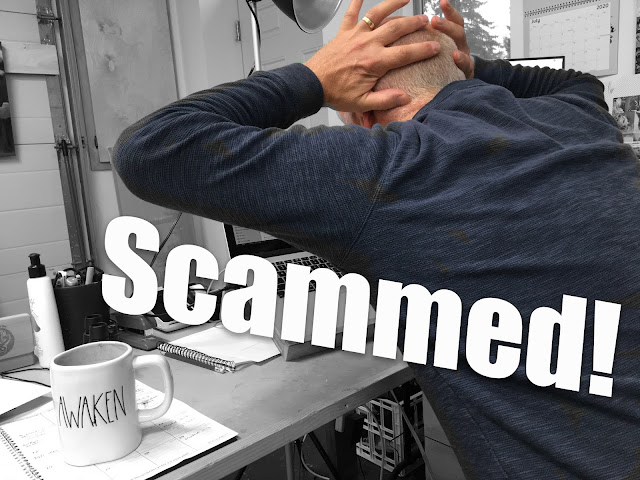Scammed
First of all, I have to share that I have sold lots of paintings and prints to clients outside of Canada. So, getting a request to buy a recent painting from an unfamiliar client in Minnesota was not out of the realm of possibility. I'll circle back to this potential buyer in a moment.
I started getting email enquiries from people wanting to buy art a long time ago. The first one sucked me in by offering a significant budget (several thousand dollars) and a tight timeframe. I don't remember what tipped me off, but the email fraudsters have become increasingly easy to spot and completely ignore.
The words they use are not quite right, as if English is a second language.
They jump right into the purchase discussion without specifically mentioning the artwork in question.
Often, the purchase is a gift for a spouse, with a tight timeline (birthday, anniversary, etc.).
I get these kind of emails maybe a half dozen times a year. They now go completely ignored. The first rule of avoiding being scammed is not to engage at all. Some people engage, fully knowing they are dealing with a scammer, just to have some fun. It's really not a good idea.
There were lots of things different about my most recent art purchase enquiry from Minnesota. First of all, the ask came in through Instagram. That had not happened before. Second, the individual provided a mailing address right off the top. That made it seem real, but the hesitation to provide an email address so we could send an invoice made me think it might be bogus. They were insisting that they had to pay by PayPal and needed our PayPal email to send the money. I showed the conversation to Heather when she got home and her initial response was that everything seemed reasonable.
A full 18 hours went by before the individual messaged again. This time they provided an email address.
"I guess it's real," I said to Heather.
I had the artwork in question all packaged up and ready to go, but something made me hesitate to actually write out the mailing address on the box. Something said...wait until the money is in the bank.
This person wanted to pay through PayPal but said because they had recently been hacked there were a couple of extra hoops they had to go through to send larger sums of money. They had to a send a verification code to the recipient which we would need to send back to them.
As we were so close to closing the deal and it seemed completely reasonable, we didn't think it through. Frankly, we were excited and we thought we were dealing with a legitimate client by that point.
Long story short, the verification code helped this individual get into our PayPal account and start using it to buy stuff. In a second all hell broke loose as Heather received multiple email notifications of activity on the account including a purchase of several hundred euros.
Thanks to Heather's quick action with our bank, credit card company and PayPal, we staved off disaster. Passwords were changed. Multi level verification processes were put in place.
As it turns out, the card that was the default on the PayPal account had expired which meant that no charges went through. We lucked out.
What advice would I have for you to avoid getting hooked into this kind of scam or any other kind of fraudulent trap?
1. If it sounds too good to be true, it likely is too good to be true.
2. If it feels funny, trust your gut. Proceed with caution.
3. If you are suspicious, share the communication with someone close to you. They might see something that you don't.
4. Never, never, never give them anything that could lead to identity theft or account access. Our mistake was being sucked in by the verification code request.
5. If you don't know the client, never send anything off in the mail before the money has been received.
Most of these scams are super easy to spot, as the culprits are not well versed in the language. This individual was the best I have ever seen. They built trust, offered all the personal information that made it seem real, and had a great tale to suck us into the heart of the scam. This story might have had a very different ending. However, we were in a position to respond to it immediately and worked closely with our local bank, credit card company and PayPal to lock everything down. Had we been traveling or away from our computers, it would have been much more difficult to stop.
We share this, as embarrassing as it is, to help others. We got completely sucked in. Hopefully our story will prevent you from getting sucked in, too.


Thanks for sharing. The scammers are becoming more and more sophisticated...I wish they would put as much energy into doing something good!
ReplyDelete